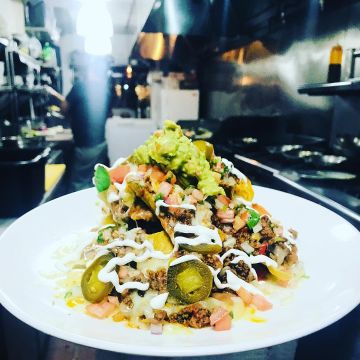Is Mexican Food Healthy And Balanced? Unpacking the Nutritional Conveniences of Conventional Active Ingredients
The inquiry of whether Mexican food is healthy and balanced invites an expedition of its traditional components. Beans and corn work as foundational staples, rich in healthy protein and fiber. Avocados supply useful fats, while numerous herbs and flavors add taste and health benefits - lunch and dinner. With each other, these components produce a tapestry of nourishment. However, the healthiness of Mexican food often depends upon prep work approaches and portion sizes. What function do these variables play in establishing its overall nutritional value?
The Power of Beans: Protein and Fiber-Rich Staples
Although often overlooked, beans function as a foundation of Mexican cuisine, using a wide range of dietary advantages. Rich in protein, they are an outstanding plant-based option for those seeking to satisfy their nutritional protein needs. This high protein content supports muscle repair work and development, making beans important for both vegetarians and meat-eaters alike. Additionally, beans are an outstanding resource of dietary fiber, which helps in digestion and promotes a sensation of volume, potentially helping with weight monitoring.
The selection of beans made use of in Mexican meals, such as black beans, pinto beans, and kidney beans, contributes to a diverse taste profile and can enhance dishes nutritionally. Additionally, beans are low in fat and include important vitamins and minerals, including magnesium, folate, and iron. Together, these attributes make beans a critical component, delivering both sustenance and nourishment in traditional Mexican price.

Corn: a Versatile Grain With Nutritional Conveniences
Corn stands apart as a functional grain fundamental to Mexican cuisine, commemorated not just for its culinary applications however additionally for its outstanding dietary account. As a key ingredient in dishes like tortillas, tamales, and pozole, corn offers crucial nutrients that contribute to a balanced diet plan. Rich in carbs, it offers as a substantial power resource, while also being low in fat, making it a positive alternative for numerous nutritional demands.
Corn is a good source of nutritional fiber, which assists in food digestion and advertises satiation. It consists of substantial quantities of vitamins such as B-complex vitamins, which are necessary for basal metabolism. The existence of anti-oxidants, specifically carotenoids, adds to total wellness by lowering oxidative stress. In addition, corn is gluten-free, dealing with those with gluten sensitivities. Overall, the nutritional advantages of corn underscore its value in traditional Mexican food and its role in a healthy diet.
Avocados: Healthy And Balanced Fats and Nutrients in Every Bite
Avocados play a substantial duty in Mexican cuisine, matching dishes with their creamy texture and abundant taste. Beyond their culinary allure, avocados are celebrated for their outstanding dietary profile. They are a rich resource of healthy and balanced monounsaturated fats, which can help reduced poor cholesterol levels and support heart health and wellness. In addition, avocados are loaded with important nutrients, consisting of potassium, vitamin E, and B vitamins, adding to total wellness.
The high fiber content in avocados help digestion and advertises satiation, making them a beneficial enhancement to any dish. Their distinct nutrient composition can likewise support skin health and wellness and offer anti-inflammatory advantages. Integrating avocados right into standard Mexican dishes or appreciating them as a standalone treat can enhance both taste and nutrition, showing why they are a beloved staple in Mexican food. Overall, avocados use a delicious means to take pleasure in healthy and balanced fats and important nutrients in every bite.

Herbs and flavors: Flavorful Wellness Boosters
While enjoying the rich flavors of Mexican food, one can not overlook the vital duty that spices and natural herbs play in boosting both preference and health. Ingredients such as oregano, cilantro, and chili peppers not just add to the vivid taste account yet additionally give significant health and wellness benefits. Cilantro is understood for its cleansing residential properties, helping to get rid of hefty metals from the body, while oregano is loaded with antioxidants and possesses anti-inflammatory effects.
Chili peppers, a staple in several Mexican recipes, contain capsaicin, which has actually been connected to enhanced metabolic process and pain alleviation. In addition, seasonings like cumin and coriander support digestion and might help in blood glucose policy. Incorporating these savory health and wellness boosters into dishes not just improves the cooking experience however likewise advertises general wellness, making Mexican food not simply delicious, yet likewise nutritionally beneficial.
Typical Food Preparation Techniques: Enhancing Nourishment and Flavor
Traditional food preparation techniques in Mexican food play a crucial role in boosting both nutrition and flavor, as they commonly prioritize time-honored techniques and fresh components. Techniques such as nixtamalization, where corn is saturated and cooked in an alkaline option, not only boost the nutrient profile of tortillas however additionally improve their digestibility - hand crafted internet margarita. In addition, read the usage of slow food preparation approaches, like cooking or braising, permits tastes to combine magnificently while keeping the honesty of the components

Frequently Asked Questions
Are Mexican Food Portions Commonly Larger Than Various Other Cuisines?
Mexican food sections are typically larger than those of several other cuisines. This particular shows traditional eating practices, stressing communal sharing and hearty dishes, which can result in an extra substantial offering size overall.
Exactly how Does the Preparation Technique Affect Healthfulness of Mexican Food?
Preparation techniques significantly affect the healthiness of Mexican food. Methods such as grilling or steaming protect nutrients, while frying can raise unhealthy fat web content. Choices of components and cooking designs ultimately figure out overall nutritional worth.
Can Mexican Food Be Customized for Particular Dietary Restrictions?
Mexican food can undoubtedly be customized for details dietary limitations. Replacements, such as utilizing corn tortillas for gluten-free diets or integrating even more veggies, enable individuals to take pleasure in typical flavors while suiting different dietary requirements.
What Prevail Mistaken Beliefs Concerning Mexican Food and Health?
Common misunderstandings regarding Mexican food include the belief that it is naturally harmful, extremely zesty, special info and solely concentrated on fats. In truth, typical recipes often feature nutritious components and can be tailored to various dietary needs.
Are There Healthier Options at Mexican Restaurants?
Healthier options at Mexican dining establishments often include smoked meats, beans, and fresh veggies. Choosing dishes that highlight whole ingredients and avoiding hefty sauces can bring about an extra nutritious eating experience, advertising total health.
The range of beans utilized in Mexican dishes, such as black beans, pinto beans, and kidney beans, adds to a diverse flavor profile and can enhance dishes nutritionally. Avocados play a significant function in Mexican cuisine, enhancing recipes with their luscious texture and abundant flavor. Incorporating avocados right into traditional Mexican dishes or appreciating them as a standalone treat can improve both flavor and nourishment, showing why they are a cherished staple in Mexican cuisine. While delighting in the abundant tastes of Mexican cuisine, one can not overlook the important role that spices and natural herbs play in enhancing both preference and health and wellness. Conventional cooking techniques in Mexican cuisine play an important duty in improving both nutrition and taste, as they frequently focus on time-honored strategies and fresh ingredients.